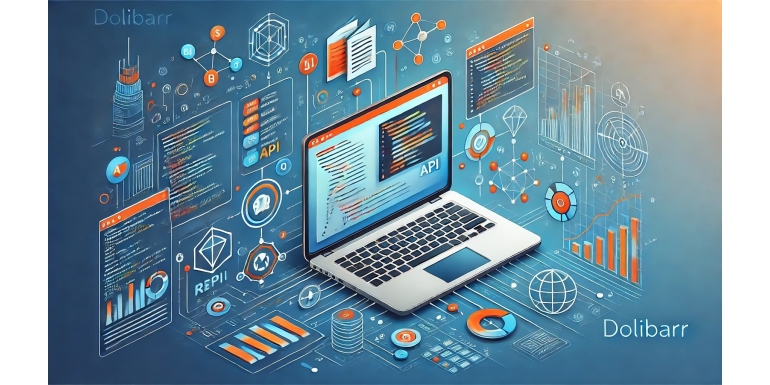
Introduction
Managing multiple applications within a business can feel like juggling too many balls at once—inefficient and error-prone. This is where ERP (Enterprise Resource Planning) systems come in, streamlining operations by integrating core business processes into a single platform. Among the many ERP tools available, Dolibarr stands out for its simplicity, adaptability, and affordability. If you're an entrepreneur, small business owner, or IT professional looking to seamlessly connect your business applications with Dolibarr, this guide to its REST API will show you how.
By the end of this article, you'll have a clear understanding of what Dolibarr is, why its REST API is so important, and how you can leverage it to power your business operations efficiently.
Understanding Dolibarr
A Brief History and Development
Dolibarr ERP & CRM began as an open-source software project aimed at small and medium-sized businesses (SMBs). First released in 2002, it was designed to prioritize simplicity and ease of use—a key distinction from more complex ERP systems. Over the years, Dolibarr has evolved into a scalable and modular platform, enabling businesses across various industries to manage everything from accounting to inventory with ease.
Dolibarr is maintained and regularly updated by a vibrant global community of developers and users, ensuring continuous improvement and long-term reliability.
Key Features and Functionalities
Dolibarr offers numerous features critical for streamlining business operations, such as:
- CRM and Sales Management: Track leads, contacts, and customer data efficiently.
- Accounting Automation: Manage invoices, expense reporting, and payments seamlessly.
- Inventory Control: Optimize supply chain processes and track stock levels.
- Human Resources (HR): Handle employee attendance, payroll, and other HR functions.
- Project Management: Manage tasks, deadlines, and team schedules effectively.
What makes Dolibarr especially attractive is its modular approach—you only use the features you need and can add modules as your business grows.
Target Audience and Ideal Business Types
Dolibarr is perfect for small to medium-sized businesses (SMBs) seeking an affordable, intuitive system. Its flexibility makes it a go-to solution for industries such as retail, manufacturing, services, and non-profits. Whether you’re a startup CEO or an IT consultant tasked with implementing ERP solutions, Dolibarr offers a blend of functionality and ease of use.
The Power of Dolibarr's API REST
The REST API of Dolibarr is a game-changer for SMBs aiming to integrate and enhance their digital infrastructure. RESTful APIs provide a standardized way for applications to communicate. Dolibarr’s API REST allows you to connect third-party applications like e-commerce platforms, payment gateways, or custom dashboards with minimal friction.
Key Benefits of Dolibarr’s REST API
-
Data Synchronization
Sync Dolibarr ERP with external systems like Magento, WooCommerce, or Shopify. Orders, inventory, and customer data can be synchronized effortlessly. -
Automated Workflows
Automate repetitive tasks, such as integrating Dolibarr with QuickBooks to automatically record invoice and payment data. -
Enhanced Reporting
Pull real-time data from Dolibarr into advanced analytics tools like Tableau or Power BI to gain deeper business insights. -
Custom Application Development
Build tailored applications using Dolibarr as your centralized data hub.
How to Integrate Dolibarr’s API REST in Your Business Applications
-
Setting Up the API
- Log into Dolibarr as an admin.
- Navigate to the Modules/Applications settings.
- Activate the API module and generate API keys for secure access.
-
Authentication Dolibarr uses OAuth2 tokens or an API key-based approach for secure communication. Choose the method that best suits your use case.
-
Using Endpoints
- Access specific modules via API endpoints, such as:
GET /api/index.php/customersto fetch customer data.POST /api/index.php/invoicesto submit invoice details.
- Tools like Postman or cURL are useful for testing before full integration.
- Access specific modules via API endpoints, such as:
-
Building Automations Use programming languages (like Python or PHP) or workflow tools (e.g., Zapier) to automate processes such as updating e-commerce inventory.
Real-Life Success Stories
Case Study 1: Retail Management
A retail SME integrated Dolibarr with its Magento store using the REST API. Outcomes included:
- A 30% reduction in operational overhead.
- Faster order processing with real-time inventory updates.
Case Study 2: SaaS Startup
A SaaS startup embedded Dolibarr into its custom client portal, achieving:
- Automated billing processes.
- Improved client satisfaction with accurate reporting.
Testimonials
- "Dolibarr has transformed the way we manage projects and invoices. Its API integrations have been seamless." – Laura, Entrepreneur
- "The Dolibarr REST API made it easy to synchronize our e-commerce store and simplify order management." – James, IT Lead
Key Considerations When Adopting Dolibarr’s REST API
- Technical Expertise: Ensure your team has the skills to work with APIs.
- Business Goals: Identify key workflows or data exchanges to optimize.
- Scalability: Leverage Dolibarr’s modularity to expand as your business grows.
Unlock the Full Potential of Dolibarr
Dolibarr’s REST API empowers businesses to enhance connectivity and optimize operations efficiently. By integrating your applications with this powerful tool, you’ll improve productivity and gain a competitive edge.
If you’re ready to transform your business processes, explore Dolibarr’s REST API today! For expert guidance, contact our team for a consultation.
